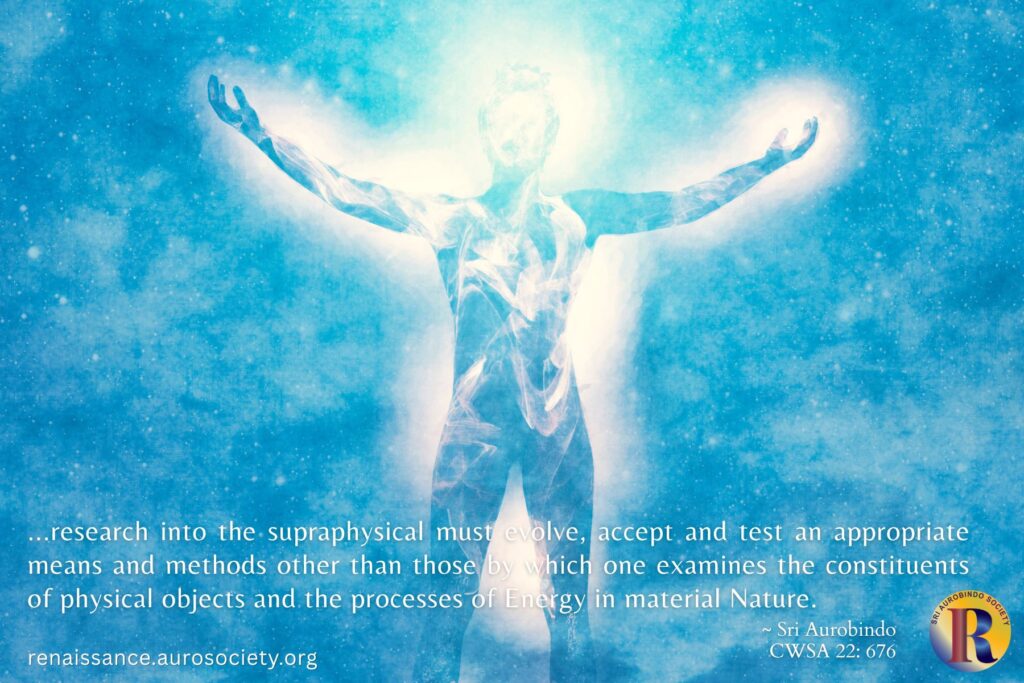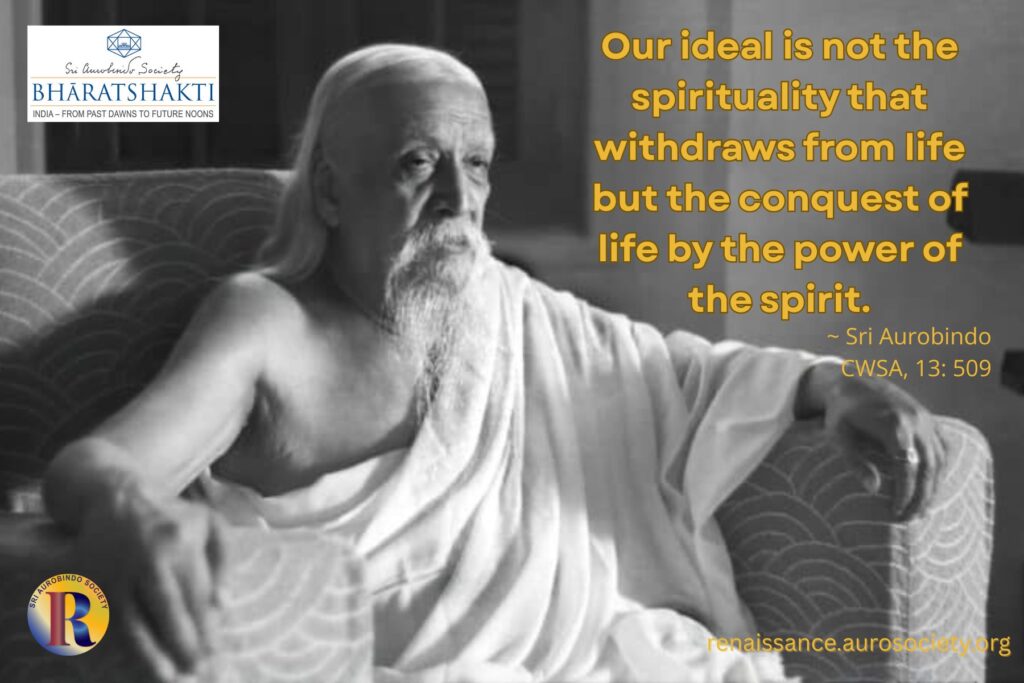Vol. III, Issue 5
Author: Sri Aurobindo
Editor’s note: Speaking of the last four attributes in the Mother’s symbol, the Mother once said that the soul-qualities of Goodness, Generosity, Equality and Peace concern our attitudes toward humanity. Building upon the insights presented in the previous issue on Goodness, in this ‘Generosity’ issue we feature three passages from Sri Aurobindo that give us a deep understanding of the inner significance of practicing higher virtues.

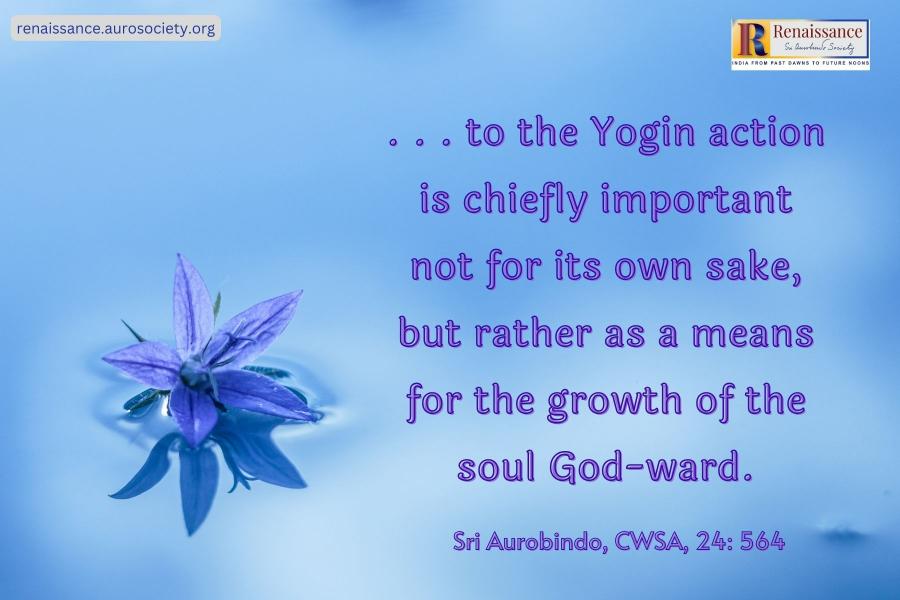
Growing into Divine Nature is the Consummation of the Ethical Being
Ordinarily, ethics is regarded as a sort of machinery of right action, the act is everything and how to do the right act is the whole question and the whole trouble. But to the Yogin action is chiefly important not for its own sake, but rather as a means for the growth of the soul God-ward.
Therefore what Indian spiritual writings lay stress upon is not so much the quality of the action to be done as the quality of the soul from which the action flows, upon its truth, fearlessness, purity, love, compassion, benevolence, absence of the will to hurt, and upon the actions as their out-flowings.
The old western idea that human nature is intrinsically bad and virtue is a thing to be followed out in despite of our fallen nature to which it is contrary, is foreign to the Indian mentality trained from ancient times in the ideas of the Yogins.
Our nature contains, as well as its passionate rajasic and its downward-tending tamasic quality, a purer sattwic element and it is the encouragement of this, its highest part, which is the business of ethics. By it we increase the divine nature, daivī prakṛti, which is present in us and get rid of the Titanic and demoniac elements.
Not therefore the Hebraic righteousness of the God-fearing man, but the purity, love, beneficence, truth, fearlessness, harmlessness of the saint and the God-lover are the goal of the ethical growth according to this notion. And, speaking more largely, to grow into the divine nature is the consummation of the ethical being.
This can be done best by realising God as the higher Self, the guiding and uplifting Will or the Master whom we love and serve. Not fear of him, but love of him and aspiration to the freedom and eternal purity of his being must be the motive.
~ Sri Aurobindo, CWSA, Vol. 24, pp. 564-565
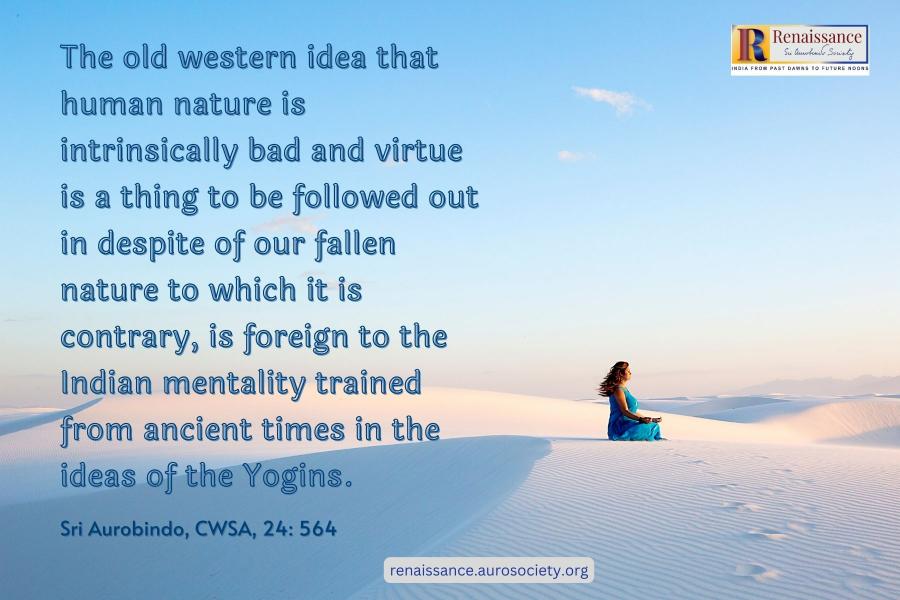

Ideal Higher Mind and Practicing Higher Virtues
The virtue that demands a reward for acting well and needs a penalty to keep it walking in the straight way, is no real portion, no true law of the ethical being, but rather a mixed creation, a rule of his practical reason that seeks always after utility and holds that to be right which is helpful and expedient, a rule that looks first not at the growth of the soul but at the mechanical securing of a regulated outward conduct and to secure it bribes and terrifies the vital being into acquiescence and a reluctant subordination of its own instincts and natural ventures.
The virtue so created is an expediency, a social decency, a prudent limitation of egoism, a commercial substitute for the true thing; or, at best, it is a habit of the mind and not a truth of the soul, and in the mind a fabrication, mixed and of inferior stuff, a conventional virtue, insecure, destructible by the wear and tear of life, easily confused with other expediencies or purchasable or conquerable by them,—it is not a high and clear upbuilding, an enduring and inwardly living self-creation of the soul.
Whatever its practical utility or service as a step of the transition, the mental habit of confusion and vitalistic compromise it fosters and the more questionable confusions and compromises that habit favours, have made conventional morality one of the chief of the forces that hold back human life from progressing to a true ethical order.
From our last issue:
Sri Aurobindo on the Essence of Ethics
If humanity has made any lasting and true advance, it has been not through the virtue created by reward and punishment or any of the sanctions powerful on the little vital ego, but by an insistence from the higher mind on the lower, an insistence on right for its own sake, on imperative moral values, on an absolute law and truth of ethical being and ethical conduct that must be obeyed whatever the recalcitrances of the lower mind, whatever the pains of the vital problem, whatever the external result, the inferior issue.
This higher mind holds its pure and complete sway only on a few high souls, in others it acts upon the lower and outer mind but amidst much misprision, confusion and distortion of thought and will and perverting or abating mixture; on the mass of men governed by the lower egoistic, vital and conventional standards of conduct its influence is indirect and little.
None the less it gives the clue we have to follow in order to pursue the spiral ascent of the lines of Karma. And first we observe that the just man follows the ethical law for its own sake and not for any other purpose whatsoever, is just for the sake of justice, righteous for the sake of righteousness, compassionate for the sake of compassion, true for the sake of truth alone.
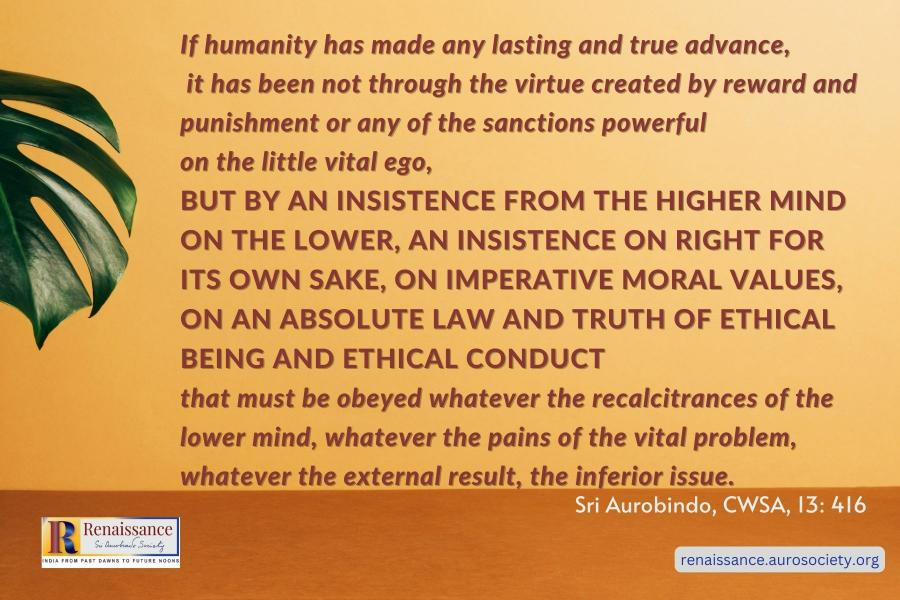
Harishchandra sacrificing self and wife and child and kingdom and subjects in an unswerving fidelity to the truth of the spoken word, Shivi giving his flesh to the hawk rather than fall from his kingly duty of protection to the fugitive, the Bodhisattwa laying his body before the famished tiger, images in which sacred or epic legend has consecrated this greater kind of virtue, illuminate an elevation of the ethical will and a law of moral energy that asks for no return from man or living thing or from the gods of Karma, lays down no conditions, makes no calculation of consequence, of less or more or of the greatest good of the greatest number, admits neither the hedonistic nor the utilitarian measure, but does simply the act as the thing to be done because it is right and virtue and therefore the very law of being of the ethical man, the categorical imperative of his nature.
This kind of high absoluteness in the ethical demand is appalling to the flesh and the ego, for it admits of no comfortable indulgence and compromise, no abating reserves or conditions, no profitable compact between the egoistic life and virtue.
It is offensive too to the practical reason, for it ignores the complexity of the world and of human nature and seems to savour of an extremism and exclusive exaggeration as dangerous to life as it is exalted in ideal purpose. Fiat justitia ruat coelum, let justice and right be done though the heavens fall, is a rule of conduct that only the ideal mind can accept with equanimity or the ideal life tolerate in practice.
And even to the larger ideal mind this absoluteness becomes untrustworthy if it is an obedience not to the higher law of the soul, but to an outward moral law, a code of conduct. For then in place of a lifting enthusiasm we have the rigidity of the Pharisee, a puritan fierceness or narrowness or the life-killing tyranny of a single insufficient side of the nature.
This is not yet that higher mental movement, but a straining towards it, an attempt to rise above the transitional law and the vitalistic compromise. And it brings with it an artificiality, a tension, a coercion, often a repellent austerity which, disregarding as it does sanity and large wisdom and the simple naturalness of the true ethical mind and the flexibilities of life, tyrannising over but not transforming it, is not the higher perfection of our nature.
But still even here there is the feeling out after a great return to the output of moral energy, an attempt well worth making, if the aim can indeed so be accomplished, to build up by the insistence on a rigid obedience to a law of moral action that which is yet non-existent or imperfectly existent in us but which alone can make the law of our conduct a thing true and living,—an ethical being with an inalienably ethical nature.
No rule imposed on him from outside, whether in the name of a supposed mechanical or impersonal law or of God or prophet, can be, as such, true or right or binding on man: it becomes that only when it answers to some demand or aids some evolution of his inner being.
And when that inner being is revealed, evolved, at each moment naturally active, simply and spontaneously imperative, then we get the true, the inner and intuitive Law in its light of self-knowledge, its beauty of self-fulfilment, its intimate life significance.
An act of justice, truth, love, compassion, purity, sacrifice becomes then the faultless expression, the natural outflowering of our soul of justice, our soul of truth, our soul of love and compassion, our soul of purity or sacrifice.
And before the greatness of its imperative mandate to the outer nature the vital being and the practical reason and surface seeking intelligence must and do bow down as before something greater than themselves, something that belongs directly to the divine and the infinite.
~ Sri Aurobindo, CWSA, Vol. 13, pp. 415-418

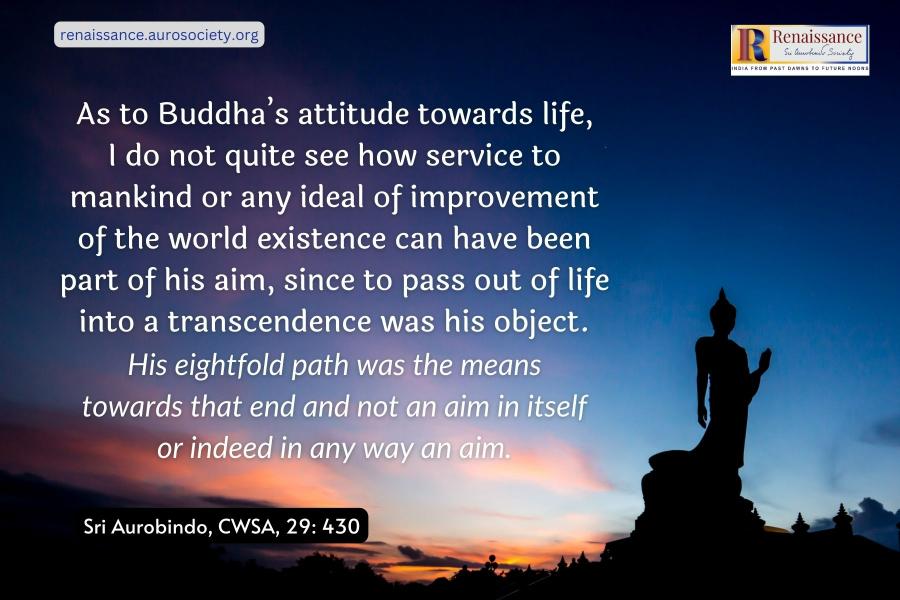
Service to Mankind and Buddha’s Teaching
As to Buddha’s attitude towards life, I do not quite see how service to mankind or any ideal of improvement of the world existence can have been part of his aim, since to pass out of life into a transcendence was his object. His eightfold path was the means towards that end and not an aim in itself or indeed in any way an aim.
Obviously if right understanding and right action became the common rule of life, there would be a great improvement in the world, but for Buddha’s purpose that could be an incidental result and not at all part of his central object. You say, “Buddha himself urged the necessity to serve mankind: his ideal was to achieve a consciousness of inner eternity and then be a source of radiant influence and action.” But where and when did Buddha say these things, use these terms or express these ideas?
Don’t miss:
Sri Aurobindo on Ego, Altruism and Self-development
“The service of mankind” sounds like a very modern and European conception; it reminds me of some European interpretations of the Gita as merely teaching the disinterested performance of duty or the pronouncement that the whole idea of the Gita is service. The exclusive stress or overstress on mankind or humanity is also European.
Mahayanist Buddhism laid stress on compassion, fellow-feeling with all, vasudhaiva kuṭumbakam, just as the Gita speaks of the feeling of oneness with all beings and preoccupation with the good of all beings, sarvabhūtahite ratāḥ, but this does not mean humanity only but all beings and vasudhā means all earth-life. Are there any sayings of Buddha which would justify the statement that the object or one object of attaining to Nirvana was to become a source of radiant influence and action?
The consciousness of inner eternity may have that result, but can we really say that that was Buddha’s ideal, the object which he held in view or for which he came?
~ Sri Aurobindo, CWSA, Vol. 29, pp. 430-431

~ Design: Beloo Mehra

